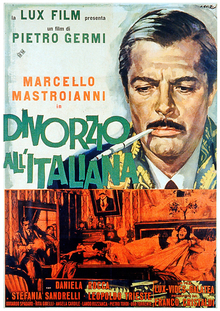
Divorce Italian Style
Divorce Italian Style (Italian: Divorzio all'italiana) is a 1961 Italian black comedy film directed by Pietro Germi. The screenplay is by Germi, Ennio De Concini, Alfredo Giannetti, and Agenore Incrocci, based on Giovanni Arpino's novel Un delitto d'onore (English title A Crime of Honor). It stars Marcello Mastroianni, Daniela Rocca, Stefania Sandrelli, Lando Buzzanca, and Leopoldo Trieste.
Divorce Italian Style
Carlo Di Palma
Leonida Barboni
- 20 December 1961
108 minutes
Italy
Italian
$2.3 million (US/Canada rentals)[1]
It received the Academy Award for Best Original Screenplay, two Golden Globe Awards and numerous other International film prizes. In 2008, the film was included in the Italian Ministry of Cultural Heritage's 100 Italian films to be saved, a list of 100 films that "have changed the collective memory of the country between 1942 and 1978."[2]
Plot[edit]
Ferdinando Cefalù, a 37-year-old impoverished Sicilian nobleman, is married to Rosalia, a devoted wife he no longer loves. He is in love with his cousin Angela, a 16-year-old girl he sees only during the summer because her family sends her away to Catholic school in the city. Besides his wife, he shares his life with his elderly parents, his sister, and her fiancé, a funeral director. The family share their once stately palace with his uncles, who are slowly but surely eating away the remainders of their once rich estate.
Aware that divorce is illegal, Ferdinando fantasizes about doing away with his wife, such as by throwing her into a boiling cauldron, sending her into space in a rocket, or drowning her in quicksand. After a chance encounter with Angela during a family trip, he discovers that she shares his feelings.
Inspired by a local story of a woman who killed her husband in a rage of jealousy, he resolves to lead his wife into having an affair so that he can catch her in flagrante delicto, murder her, and receive a light sentence for committing an honour killing. He first needs to find a suitable lover for his wife, whom he finds in the local priest's godson, Carmelo Patanè, a painter who has had feelings for Rosalia for years. For a time he was presumed killed during World War II. Ferdinando also procures the State Prosecutor's friendship with a small favor. The final stage of his plan is to arrange for Carmelo's constant presence in his house, which he achieves by feigning interest in having his palace frescoes restored.
But Carmelo is timid with Rosalia, and she is initially committed to conjugal fidelity. Ferdinando tapes their private conversations and has to ward off the maid Sisina's infatuation with Carmelo. After Carmelo makes a pass at Sisina, she tells the priest, Carmelo's godfather, at confession, who informs her that Carmelo is married with three children. She relays that information to Ferdinando. Rosalia and Carmelo finally give in to their passion, but the tape of their conversation runs out just as they are arranging their next meeting. All Ferdinando knows is that it will take place the next evening.
Rosalia feigns a headache and remains home while the rest of the family goes to the cinema to see the local première of La Dolce Vita, a film so scandalous that no one wants to miss it. Ferdinando sneaks out of the theater and returns home, arriving just in time to see Rosalia leaving for the train station. He retrieves his gun to kill her, but arrives at the station just after their train departs. He revisits his plan and the Criminal Code. It defines a crime of passion as executed in the heat of the moment or in defense of one's honor, so he embraces the role of a cuckold.
All along, Angela has been writing Ferdinando to assure him of her undying love for him. Her last letter is misdelivered to her father, who dies of a heart attack upon reading it. At the funeral, Ferdinando is approached by Mrs. Patanè, who demands to know what he will do about their situation. After he responds noncommittally, she spits in his face in front of the entire town, which gives him what he needs: an open insult to the family's honor due to his wife's elopement.
The local Mafia boss offers to find the lovers within 24 hours, which he does. As Ferdinando goes to the lovers' hideout, he hears Mrs. Patanè kill Carmelo. He follows suit and kills Rosalia. At his trial he is defended by the State Prosecutor, who blames the whole thing on Ferdinando's father, saying that he failed to give his son enough love when raising him as a boy. Ferdinando is released from prison after three years and returns home to find Angela waiting for him.
Later, Ferdinando and Angela are happily sailing at sea. As they kiss, Angela seductively rubs her feet against those of the workman piloting the boat.
Reception[edit]
Critical Reception[edit]
Review aggregator website Rotten Tomatoes reported an approval rating of 100% based on 17 reviews.[4] Upon release in the United States, Bosley Crowther of The New York Times called it "one of the funniest pictures the Italians have sent along" and praised Germi as "a genius with the sly twist."[5] James Powers of The Hollywood Reporter praised the "mocking, sardonic farce" as "bold, irreverent, and human to the bone," and he predicted it would be successful in America due its dual nature as both an arthouse film and a film that achieves general appeal.[6] Variety gave the film a positive review, calling the satire "a penetrating, almost brutal glimpse of Sicily and its antiquated way of life."[7][8]
Adaptations[edit]
In 2008 Giorgio Battistelli adapted Divorce Italian Style into an opera, Divorce à l'Italienne, which premiered by the Opéra national de Lorraine on September 30 of that year with tenor Wolfgang Ablinger Sperrhacke in Mastroianni's role. Battistelli chose to set every female role except Angela for low male voice; Bruno Praticò sang the role of Rosalia.[15]